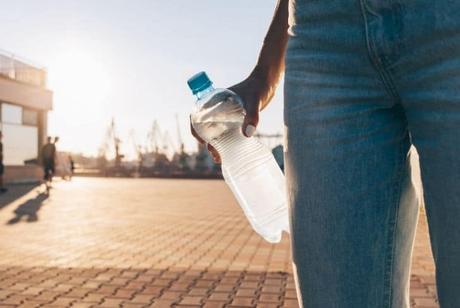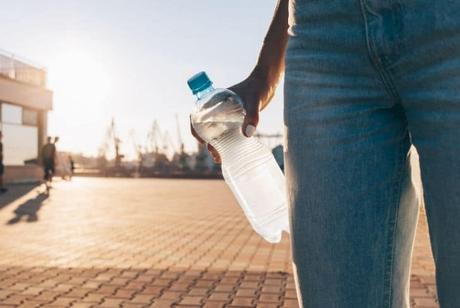Are Plastic Water Bottles Recyclable?
Definitely at some point in your life, you would have certainly come in contact with bottles of some kind. Be it a plastic bottle, glass bottle or even bottles that are made out of steel or aluminum. The basic point is that you have most likely drunk from a bottle or made use of one.
However valuable and essential these bottles are, one thing is guaranteed, and that is the fact that you cannot use them forever. You will certainly get tired of using it and may just decide to change it for no definite reason. It could also be because the bottles are old or broken.

Whichever is the case for you, chances are that you give very little or no regard to the bottle once you’re done, and you immediately toss it into a trash can. Do you ever think about what happens to the plastic bottle once you toss it into the trash can? Are plastic water bottles recyclable? If not, then what types of bottles can be recycled? Do these water bottles add any advantage to the environment? What are the other things you can do with water bottles asides from recycling them?
This article is filled with a lot of information that you can’t miss out on. We would advise that you get a calm and relaxing area and follow us through till the end. We would answer all these questions and other similar questions. So, dive in!
Can You Recycle Plastic Water Bottles?
Nowadays recycling is such a common phenomenon and almost everything now undergoes recycling. Of course, plastic water bottles are no exception. To our topical question, can you recycle plastic water bottles, in simple terms, the answer to the question is Yes. you can recycle plastic water bottles. As the name suggests, it is made with plastics, and almost all plastic materials can be repurposed into new material.
Most plastic water bottles are made of a component called polyethylene terephthalate (PET). This plastic component is quite flexible, light and, of course, recyclable. This PET plastic material is what makes the plastic bottles recyclable. In this light, it’s safe to say that if your plastic water bottle isn’t made of PET, then it’s most likely not recyclable. As such, before turning in your plastic water bottles for recycling, you might want to pause for a second and find out if it contains polyethylene terephthalate (PET).
Can You Recycle Glass Water Bottles?
By now, you know for a fact that you can most likely recycle your plastic water bottles as long as they are made up of polyethylene terephthalate (PET). But then, the question of bottle recycling doesn’t just stop at plastics. If you have been wondering about the possibility of recycling glass water bottles as well, then you are in the right place. keep reading to find out.
Well, glass water bottles can be recycled. It’s quite simple. All you need to do is take them to a recycling center or manufacturing plant and have them recycled. The recycling process of glass water bottles is quite distinct from the regular bottles as they are usually broken down into tiny pieces called cullet. This broken piece can in turn be collected, sorted and mixed up to make new bottles of different sizes and colors.
It would interest you to know that recycling glass bottle has certain advantages such as;
- It saves cost in that recycling of glass water bottles takes up far less energy when compared to the energy used in making these glass bottles from the scratch.
- Recycling glass bottles also help in about a 20% reduction of air pollution and 50% of water pollution.
- The recycling of water glass bottles helps in freeing up space in landfills.
There you have it! Glass bottles can be recycled. However, do keep in mind that some recycling plants do not accept glass water bottles for recycling as they sometimes do not have the right facilities to recycle them. So, the obligation seems to be on you to find out if your local recycling station has the right facilities before sending in your glass water bottles.
Are Water Bottles Biodegradable?
When it comes to water bottles, we understand that you might be curious as regards their capability to biodegrade. The truth is, they biodegrade. This should definitely not be a surprise because their components which are either plastic or glass are capable of biodegradation.
You should note that plastics will not naturally biodegrade except if they are subjected to industrial processing of biodegradation. There are however bottles that are made of biodegradable plastics and are capable of biodegrading without any extensive process.
However, it should be at the back of your mind that the biodegrading process is quite different and extremely lengthy. Glass and plastic water bottles do not biodegrade for at least 100’s of years. It’s sometimes thought that they will never biodegrade but after a really long time, they eventually start to break down slowly. The truth is, many of the glass and plastic water bottles used today will most likely outlive us and remain in the landfill if they are not recycled.
Biodegradable Plastics also take about 3 to 6 months to biodegrade. This is also dependent on environmental factors such as the environment as well as the moisture content available around the plastic.
Are Water Bottles Bad For The Environment?
One major aspect of purchasing various items is trying to ensure that they are safe as well as environmentally friendly. As such, when buying items, we often ask ourselves whether they will pose a threat to the environment. And that is the reason we are asking if water bottles are bad for the environment?
Just in case you had no idea, water bottles are bad for the environment. We are sure you are most likely wondering why something as seemingly harmless as a water bottle can be bad for the environment. The reason is not far fetched. It is because water bottles cause various types of damages to the environment.
Firstly, let’s talk about the dangers of plastic water bottles and their components.
Plastic water bottles are made up of PET (polyethylene terephthalate, a form of polyester). This component requires a huge amount of fossil fuels which can be hazardous to the environment. Also, plastic water bottles do not decompose or biodegrade in a short time except they are made from biodegradable materials. These plastics in turn fill up landfills and keep taking up more spaces than necessary till they eventually cause land pollution. They might even be washed to the sea where they will pose danger to the aquatic animals.
Certain studies also show that decomposing of plastic water bottles can be hazardous to people’s health as they tend to cause health issues like cancer. The production process of plastic bottles also causes the release of toxic chemicals such as carbon dioxide into the environment thus causing air pollution.
In a bid to protect the environment, your best bet when purchasing a water bottle is to opt for a steel water bottle as they are way more environmentally friendly than plastic water bottles
Are Water Bottles Caps Recyclable?
Now that we have examined the possibility of recycling water bottles in general. Let’s proceed to assess the possibility of recycling their caps. Succinctly put, Yes, you can recycle bottle caps.
This might be somewhat confusing especially if you have once heard that bottle caps should be removed before rendering the bottles in for recycling. Most bottles mostly come in the form of either plastics or metals, and both of them can be recycled.
The most important thing to note here is that before you recycle bottle caps, you must make sure that you unscrew them from the container and sort them into separate entities away from the water bottle. Apart from this, you can very well recycle water bottle caps.
So, in case you have been wondering, you just got the answer! Feel free to turn in your water bottle caps at the recycling center. First, ensure that they accept such at any recycling center you go to. Once they approve, then you are good to go!
What Can You Do With Old Water Bottles?
Perhaps you are no longer interested in your old water bottles, or maybe you just don’t want them lying around your house. Instead of throwing them away and probably littering the landfill, there are certainly tons of ways for you to create lively reuse of your old water bottles. Let’s check out some of these ways.
1. Make A Sprinkler And Bottle Feeders
In case you own some outdoor plants or a lawn, you can decide to keep them happy by using your old water bottles as sprinklers. All you need do is simply poke holes in them, connect the water hose and hold it in place firmly with tape. Turn on the tap and watch your sprinklers come to life. You can also use your old water bottles as bird feeders.
2. Create A Wall Of Art
As silly as it sounds, you can make use of your old water bottles to create a wall of art. All you need is to gather different plastic bottles of different colors, and there you can easily create an artistic and aesthetically pleasing craft project using water bottles.
3. Make A Piggy Bank
A plastic water bottle can be transformed into a piggy bank. Just cut a little hold on the bottle cap so you can drop your money in it. This way, you get to encourage a good saving culture with yourself and among those around you.
4. Make Storage Containers
Old water bottles can make good storage containers. You get to store anything of your choice in them as long as they fit into the bottles properly. This way, you also get to save money on buying storage containers.
5. Home Accessories And Party Decorations
With just an old water bottle, you can create awesome party decorations, especially for outdoor events. You can also create toys and various other kid’s crafts out of these water bottles. Additionally, you can use them as accessories within your home as a supply cup, a bottle planter, etc.
Conclusion
Every year, nothing less than 60 million Americans make use of and drink out of water bottles. Now imagine what happens when you continue being indifferent about its disposal. Best believe that if everyone continues being indifferent about the disposal of water bottles, we would no sooner than later have a global challenge at hand.
This obviously can be easily avoided. You can contribute your own quota for the benefit of the environment. You can start by being conscious of how you dispose seemingly of unimportant things starting with your water bottles
References:
https://healthyhumanlife.com/blogs/news/plastic-water-bottle-pollution-plastic-bottles-end
https://www.budgetdumpster.com/blog/diy-plastic-bottles-recycling/


